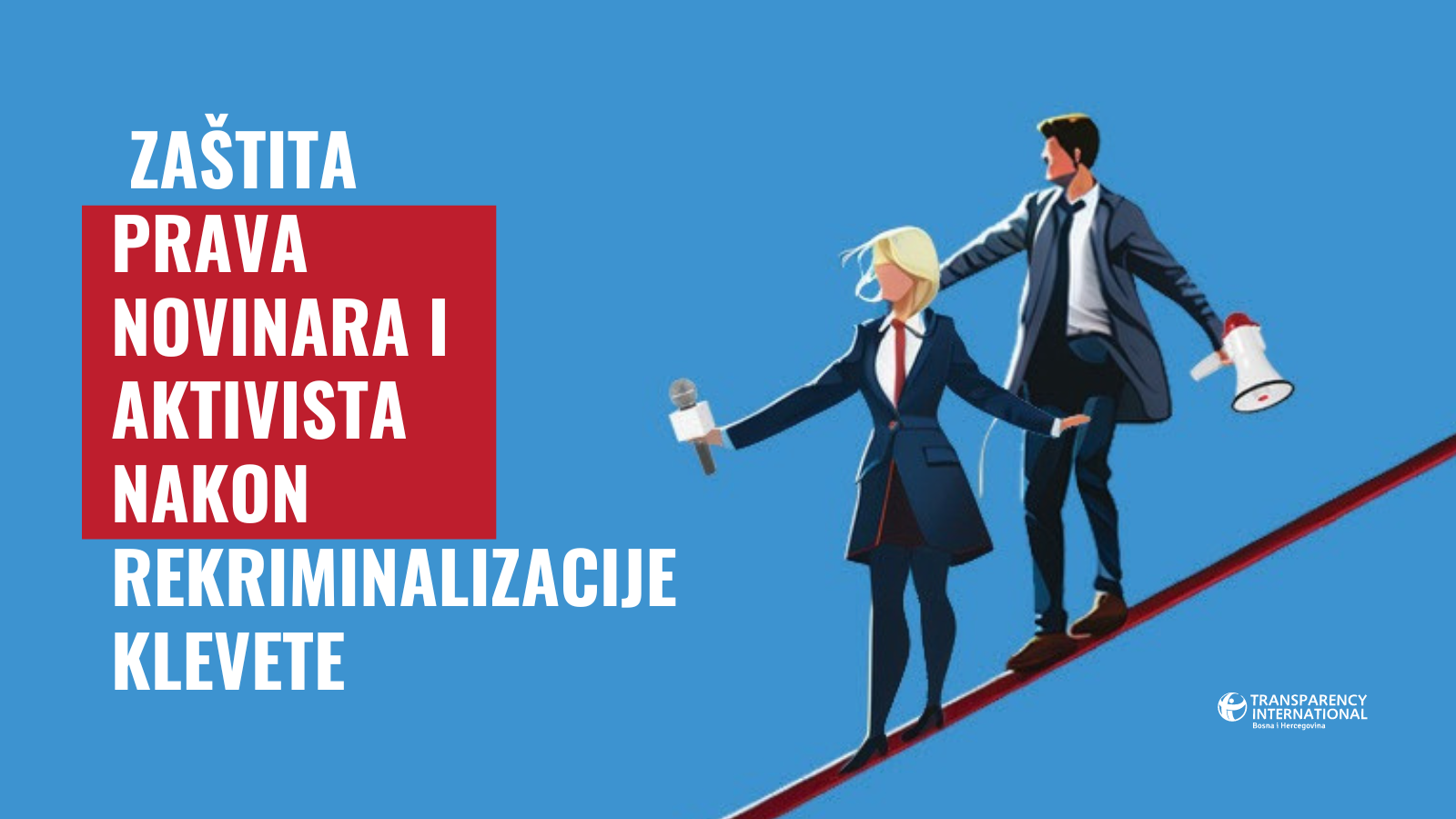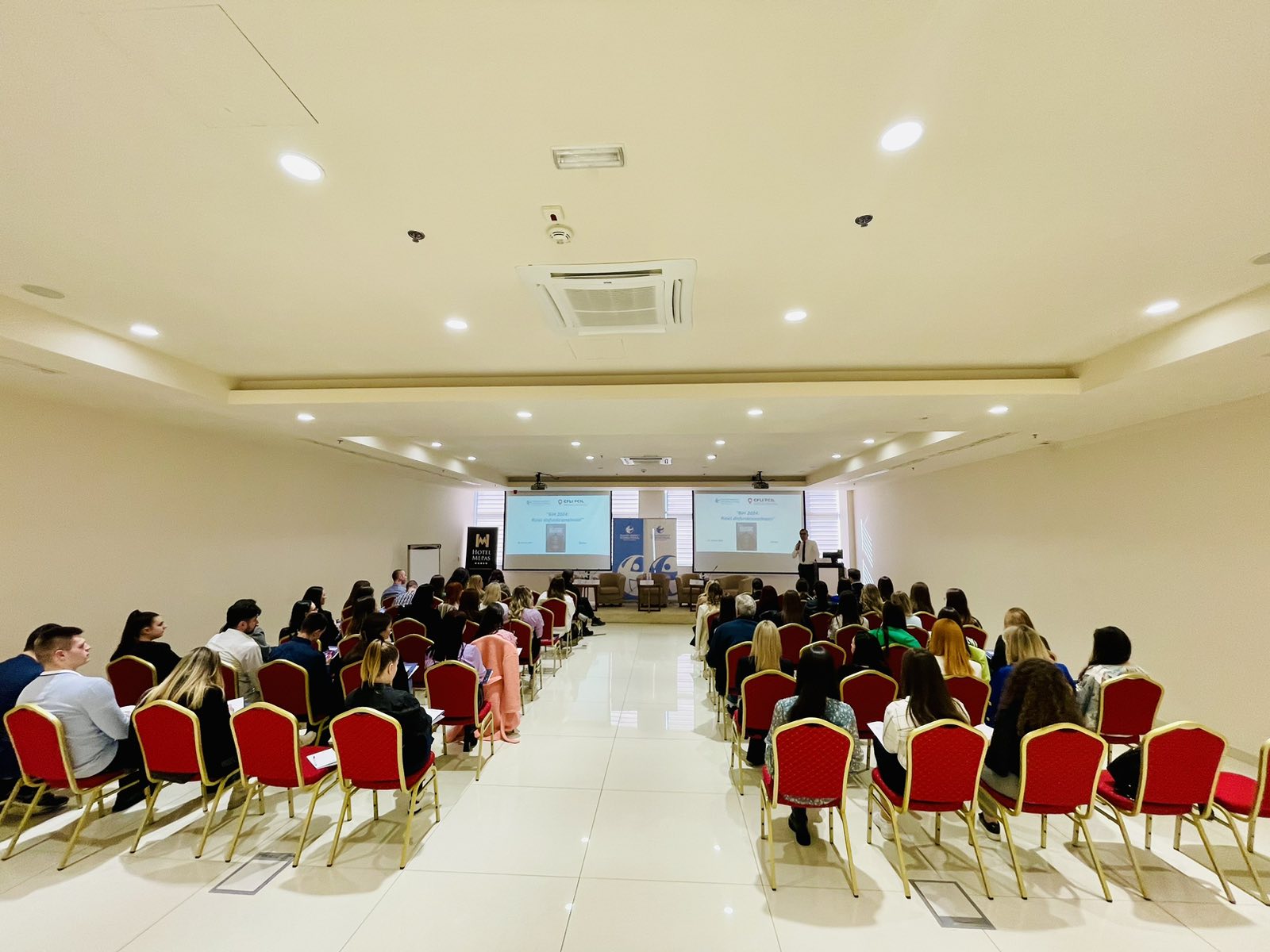Evaluation meeting, Advocacy and Legal Advice Centre, Sarajevo, 28.02.2004
Since february 2004, Transparency International BiH (TI BiH) Advocacy and Legal Advice Centre thru free telephone line 0800-55555 and web service www.ti-bih.org receive more then...

Since february 2004, Transparency International BiH (TI BiH) Advocacy and Legal Advice Centre thru free telephone line 0800-55555 and web service www.ti-bih.org receive more then 3500 calls, and more then 400 documented cases from citizens in whole BiH.
Thru this regional programme, TI BiH Advocacy and Legal advice Centre is tool for faster economic development, promotion of human rights and civil society development in BiH and region. Daily direct contacts with the citizens and institutions are giving a picture of most often kinds of corruption in individual areas, their disclosure, strengthening and help to the institutions in prevention of individual cases, as well as preventive work on decreasing the different sorts of corruption. So far the project has resulted in 7 reports to the competent prosecutor Public Prosecutor’s Offices, over 400 internal controls and investigations as well as suspensions and dismissals of corrupt officials.
Monitoring process of the cases was encircled thru good cooperation with High Judicial and Prosecutorial Council BiH. TI BiH directly refers citizens to institutions and other relevant organisations giving them best inputs and recommendations, advising them to observe the Law on Freedom of Access to Information and encouraging them to directly appeal to the institutions. By using the resources of its library, the Centre continuously keeps citizens informed of and educated about their rights and obligations.
More and more citizens are requesting information directly from the relevant institutions, so the Centre receives calls on a daily basis from citizens who wish to thank the Centre for the advice they received as well as to express their support to TI BiH’s work. The citizens’ complaints are mostly on the work of inspection bodies, especially construction, trade and labour inspections, public companies, education, services of ministry, health care and international organisations, more than 400 documented cases in total.
An evaluation meeting with the representatives of the relevant institutions was organised a year after the implementation of the project. The aim of the meeting was to sum up the project results that have been achieved to date, evaluate the achieved level of cooperation and mutual trust, point to problems, failures and possible gaps, and set out guidelines for future work. The meeting was attended by the representatives of 24 institutions, including several line ministries, public prosecutor’s offices, local authorities, international organisations, judicial bodies, ombudsperson offices and public audit agencies.
The project has shown that the most corrupt institutions are the public sector and public companies, where non-transparent work, embezzlement, defalcation and other sordid affairs involving high-ranked officials have been reported a number of times. These are closely followed by local authorities and their inspectorates (building, market and labour inspectorates, in particular), which clearly lack integrity as they are loyal to political parties and local high-ranked officials and involved in fraudulent dealings. They rarely demonstrate willingness to take repressive measures against lawbreakers.
So, we can still see cigarettes with foreign excise tax stamps being sold freely, we see lack of control on part of the relevant institutions with respect to price formation for certain goods and services, quality of these goods and services and sale of goods without origin or with dubious origin. We can still witness provision of services where no adequate conditions for their provision exist whatsoever, building without building licence or with dubious decisions of the competent organs, and a number of other irregularities.
Besides the lack of expeditiousness and inadequate support to the work of courts and public prosecutor’s offices, there is also a question of performance of relevant inspectorates who fail to exercise their authority when there are valid court decisions that are not complied with as well as in cases where the relevant inspectorates are expected to initiate appropriate procedures. There are serious problems with respect to violation of rights stemming from labour relations. Sanctions imposed against the majority of offenders in such cases have been too mild. Another thing that was pointed out is that there is no adequate Law on Labour Inspectorate in FBiH, which poses a serious problem to labour inspectorates, but does not absolve them from responsibility in cases where they failed to report irregularities to the public prosecutor’s offices, which is their legal obligation if they have any knowledge of irregular dealings. As far as the severity of reports submitted to the public prosecutor’s offices is
concerned, it is certain that they are not treated equally in BiH if they are submitted by the relevant organ or by the injured party or citizen, although they should.
Another problem identified was corruption in education, health care and social welfare and this problem has long-term repercussions. Apart from the inadequate legislation and lack of a significant number of legal procedures required for these fields, inspection organs failed too, especially in terms of transparent funding of these institutions, professional level of their staff, nepotism and tremendous political pressure exerted on them. What is lacking is new standards and parameters for quality assessment as well as a great number of procedures.
The representatives of tax administration offices mentioned a visible progress in terms of increased tax collection rate, although it is the reform in this field that is expected to produce the desired results. Another serious problem that was mentioned at the evaluation meeting relates to the Law on Ownership of Public Revenues as well as to the fact that lawmakers simply do not listen to law-implementers, which causes a lot of confusion and turbulence. On the other hand, we have to commend the Agency for Public Sector Audit in Republika Srpska, Ombudspersons of the Federation of BiH, Ministry of Justice and Ministry of Trade and Tourism of Republika Srpska as well as NGOs such as Centri civilnih inicijativa BiH (Centres for Civic Initiatives of BiH), Vaša prava BiH (Your Rights BiH), and Mladi istraživaci Banjaluke (Young Researchers of Banja Luka) for the progress they have made in their work.
It was mentioned that BiH has a fragmented approach to the development of an adequate anticorruption strategy and the strategy does not cover all integrity pillars. This is also the case with the Mid-Term Poverty Reduction Strategy Paper (PRSP), which treats the issue of corruption and is implemented by the Economic Policy Planning Unit. Although significant money is used to fund the work of these bodies, no adequate office has been established or an operational action plan developed yet. The 2004 Corruption Perception Study and the 2004 National Integrity System Study, published by TI BiH, gave a detailed overview of corruption-related problems and offered recommendations that were used in the development of the PRSP section that deals with corruption. However, TI BiH remains dissatisfied with the quality of implementation and suggested deadlines as well as with the majority of the measures recommended in this “Strategy”. Based on the report on implementation of the Action Plan of this “Strategy” it can be concluded that, apart from proposals of new pieces of legislation and amendments to the existing ones, which is absolutely necessary although the adoption takes quite long, this “Strategy” exclusively refers to the establishment of a large number of new institutions, committees and subcommittees which would only make the already expensive state apparatus even more expensive. The state apparatus is already spending much more than the European standards allow, again to the detriment of taxpaying citizens. Even if the new institutions are put in place, there is still no guarantee that they will perform their duties in an adequate and professional way.
The conclusion reached at the evaluation meeting shows that there is a lack of initiatives and anticorruption campaigns that would be launched and created by the existing institutions within their area of competence. It is obvious that citizens still do not have trust in the work of these institutions, institutions do not launch anticorruption initiatives and campaigns within their area of competence, while the performance of public agencies remains non-transparent and dependent on local politically powerful figures. Generally, institutions have a very poor mutual cooperation and there is virtually no exchange of information between them. Amendments to certain pieces of legislation are still being prepared, while some of them have not yet been sent to parliaments for adoption, which causes huge losses to certain sectors, leads to catastrophic delays and far-reaching consequences, threatens the utilisation of credits that have already been granted and prevents access to new development funds. We also have to note that election commissions still do not have enough capacity to fully implement the Law on Conflict of Interest and the State Border Service does not have the capacity to adequately control illegal border crossings. What accounts for the lack of long awaited investments, jobs and improvement in the quality of life is the fact that the procedures for internal audits of public revenue spending at all levels are still unclear.
On the other hand, there are some pretty good pieces of legislation in the field of Criminal Law as well as in other laws dealing with corruption (Law on Freedom of Access to Information, Law on Conflict of Interest, Law on Protection against Libel and Slander, Law on Money Laundering, Law on Protection of Witnesses, Law on Competition, Law on Businesses and Law on Public Procurement), but they are not adequately implemented and promoted in the public and they still do not produce the desired results.
The Prosecutor’s Office of BiH was commended for its work and readiness to finally tackle the most common forms of organised crime, although its authority and capacities are limited. The participants at the meeting mentioned the problems in the work of the Public Prosecutor’s Offices of FBiH and Republika Srpska, which are primarily caused by the recent expansion of their area of competence and consequent increase in the number of cases they are dealing with as well as by the fact that in certain cases investigation has not been launched yet or if launched it is conducted at a snail’s pace, while indictments are waiting for quite long. Not to mention the problems in the work of courts, especially magistrates’ courts, where, whether intentionally or unintentionally, cases regularly fall under the statute of limitations or the trials go on for as long as several years.
If we have a look at the experiences from the countries that adopted a more pragmatic approach to this problem, we can see that their institutions directly approach citizens, they are interested in solving corruption problems, they regularly monitor the situation within their area of competence, they invite citizens to report any irregularities and they inform the public about the results they achieved by using the existing mechanisms and drawing on the available resources, never increasing the administrative costs, but always increasing accountability. Certain developed countries have a practice to set up express magistrates’ courts, so several dozens of cases can be solved per day. These are the practices Bosnia and Herzegovina can learn from.
In order to improve the current situation, institutions in BiH should establish more effective mutual cooperation and create partnerships with nongovernmental organisations and the private sector. It is obvious that this is still not happening. All efforts are mainly of ad hoc character or are led by the international community or civic initiatives. The institutions are not exercising their legal authority to combat corruption. Be that as it may, TI BiH will continue its activities aimed at the strengthening of institutional capacities, creation of partner programmes and increased participation of citizens in anticorruption combat.
Uključite se
Budite u toku
Pretplatite se na naš bilten i dobijajte periodična obavještenja o našim objavama, najavama, pozivima i aktivnostima putem elektronske pošte.
Ne propustite
Ukoliko želite da dobijate naša saopštenja odmah nakon objavljivanja ostavite svoju e-mail adresu u polje ispod.



